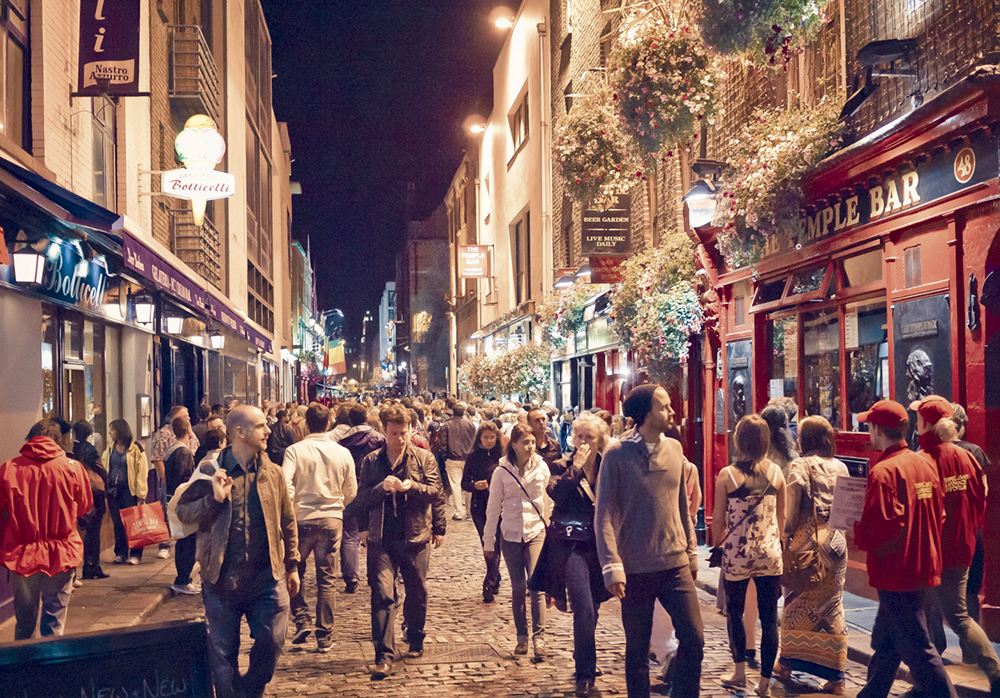Dublin City Council last week hosted the (NTE) Night Time Economy Summit with the purpose to bring together key stakeholders to discuss how to enhance Dublin’s night time economy and overcome recent negative headlines relating to diminishing city centre footfall and public safety.
There has been a renewed focus in recent years on the part of Government to develop Dublin’s night time economy and to bring it on a par with other leading European capitals. The NTE Summit was also particularly timely in light of recent Dublin riots and a growing reluctance on the part of some people to work and socialise in the city centre after dark.
In September 2021, the Department of Tourism, Culture, Arts, Gaeltacht, Sport and Media, led by Minister Catherine Martin TD, published its inaugural Night-Time Economy Taskforce report. One of the key recommendations to emerge from the report is the creation of a Dublin Mayor of Night Time Activity. As recently as August, the Minister committed to having the successful candidate in situ by Christmas this year.
The concept of a Dublin Night Mayor is not a new idea, however. The rationale for this new position is that a vibrant, wide-reaching night-time culture, shaped and steered by a dedicated mayoral office, has the potential to embolden the city’s creative scene, deliver safer streets, and renewed economic vigour. In effect, everybody wins, and we might even ease off the binge drinking in the process.
At face value, the Minister’s public commitment to the creation of this new office is a positive. However, its success will ultimately be dictated by two key factors: (1) clarity of vision and (2) budgetary and decision-making autonomy.

Clarity of vision
Dublin City Council is leading the recruitment process but has remained tight-lipped regarding the status of the appointment. It is understood to be a two-year full-time position, but details of the job spec and salary remain unclear. What is clear is that position will require an individual with a genuine clarity of vision an appetite to really make something of the role, beyond just replicating a Berlin- or London-lite on a shoestring budget.
Dublin is a different proposition to these cities and so are its inhabitants. The new night mayor will need the vision and charisma to mesh together the existing cultural iterations of Dublin’s night life into a single overarching narrative that captures the imagination of locals, addresses recent public safety issues, and challenges the lingering ‘Temple Bar-centric’ perception of its visitors.
Politically savvy
The ‘Mayor’ will also need to be politically savvy, with the skills to advance change, bring people on the journey, and win the big budgetary and policy decisions. They will have to deal with a very disparate stakeholder group and a healthy share of cynics. It will also require urgently confronting the growing public perception that Dublin city centre is no longer safe after dark. A celebrity or ambassadorial appointment is not the answer, either. The night mayor will need to want responsibility as well as power.
Institutional wariness of night life culture
The Night Time Economy Task Force Report details 36 key recommendations to deliver upon a sustainable and thriving night-time economy. In effect, there is a readymade playbook for whoever is appointed to the role.
However, Irish policymakers have historically viewed nightlife with suspicion, as something to be controlled and regulated. To overcome this, the new mayor will need to educate those controlling the purse strings on the potential return on investment. What does a buoyant night economy mean for tax receipts, tourism footfall, public order, and our A&E departments? Position it as an investment opportunity, rather than a budgetary ask.
Consultation is key
Like any public campaign or initiative, ongoing consultation and public buy-in are key. The original Night Time Economy Report included an extensive public engagement programme, encompassing 100 different stakeholder groups and 58 stakeholder submissions. The soon to be appointed Mayor must hit the ground running to keep these stakeholders engaged and on side. If the office begins to feel like a token gesture to appease the creatives, people will see through it very quickly. If the concerns of Gardai and emergency services go unheard, it has the potential to quickly unravel.

Challenging negative perceptions
December is typically the busiest month of the calendar year for the retail and hospitality sector. Consumers flock to the city centre for late night Christmas shopping, office Christmas parties, and general festive merriment. In response to recent events, many people (whether justified or not) appear reluctant to embrace their usual Christmas rituals. Inevitably, the economic and social impact of this will be manifold.
In short, making a success of the Night Mayor Office takes on even greater important. To this end, a strong, committed and well-resourced leader will be the glue that binds the Office’s objectives and credibility together. In turn, Dublin City Council must entrust those in Office with meaningful budget and decision-making authority.
The onus is now on Minister Catherine Martin TD, Minister for Justice Helen McEntee TD, and their Cabinet colleagues to fully embrace the concept of a well-resourced Night Time Mayoral Office, and resist the temptation for shortcuts or cheap imitation. Anything less may result in the Government wasting millions of euros on an initiative that fails to resonate with the public and in turn prompts further storm clouds over the perceived future of Dublin city centre.

With his intelligent communications skillset and extensive media connections, Paddy helps clients build stand-out messaging and achieve their business objectives, whether they’re a start-up raising seed capital or an established player pushing for industry reform or telling their employer brand story. Paddy has been published in a number of national publications, including the Business Post, Irish Independent, Fora.ie, and The42.ie on the theme of strategic communications and reputation management.
